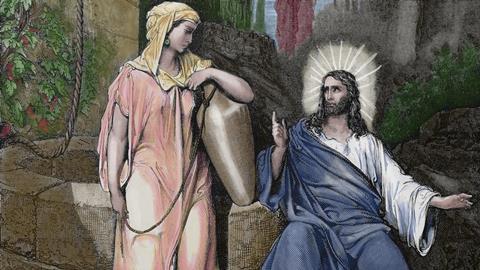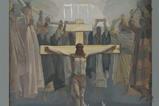While many assume church leadership has always been male, Elaine Storkey reveals there have been many women actively working in positions throughout the Church right from the start
Women have always played a key part in the spread of the gospel. I grew up reading about the intrepid women missionaries of the 19th-century who travelled from the West to Africa and Asia to tell people about Jesus, enduring heatwaves, tropical diseases and poisonous insects. They would be public Christian leaders overseas in a way they could never be back home, where churches were more restrictive about women’s roles. Leadership was traditionally reserved for men, with the women teaching Sunday schools or running women’s groups. Overseas, however, their biblical knowledge was treasured and many men who became indigenous leaders were taught the Bible by female missionaries.
It was normal in traditional Christian circles in the West to assume that this pattern of male-leadership and female submission was handed down from the apostles and predominant in the early Church. If anyone questioned this, they were immediately reminded that Jesus’ disciples were all male. But when people started to look more carefully at the women in Jesus’ ministry, that view of leadership began to change. It became evident that although Jesus followed cultural Jewish rabbi practices in choosing men as his key, intimate followers, his wider group of disciples included many women. They travelled with him, learned from him and supported his ministry. Mary and Martha were key active believers. Mary of Magdala, Joanna, Susanna, Salome, Mary, the wife of Clopas and others were the first witnesses of the resurrection and specifically commissioned to tell others. Even beyond these close groups, women were active in communicating the gospel. A woman of Samaria was effectively the first evangelist after Jesus disclosed to her that he was the Messiah (see John 4).
They would be public Christian leaders overseas in a way they could never be back home, where churches were more restrictive about women’s roles
Even though people began to acknowledge more fully the women who publicly witnessed to Jesus, the assumption remained that this pattern changed after the Church started to grow. Once believers formed groups, and people became teachers and preachers, the authority was given to men. Paul in particular was seen as reinforcing male-only leadership, requiring women to be “silent” and wives to “submit” (see 1 Corinthians 14:34-35 and Ephesians 5:22-25). Not only in Catholic and Orthodox churches, but in Protestant churches of most denominations, the principle of male leadership was handed down through history, with people believing that the matter was settled in the first century. Only churches like the Quakers or Salvation Army had a different practice.
Many biblical scholars now see this as a very partial view of leadership in the early Church. Much more careful exegesis has been given to key passages in Paul’s letters, re-interpreting what words like ‘silent’ meant in the context of women chattering and interrupting worship, or what ‘submission’ means in their relationship with men. More attention has also been paid to Paul’s affirmation of women leaders, and his own working relationships with them. We recognise that people in the early Church exercised a wide range of leadership roles and women were active in most of them. The New Testament mentions at least 27 women in the early Church who were regarded as leading members of Christ’s body and anointed by the Holy Spirit. A small number are mentioned in relation to the male leaders in their family, but most are named without any reference to husbands or fathers. So, who were these remarkable women?
Women in apostolic and teaching ministries
Junia is described by Paul as having an apostolic ministry when he greets her at the end of his letter to the Roman Church (Romans 16:7). And even though some 20th-century theologians refused to believe she was a woman and changed the ending of her name to make it male, much earlier theologians fully accepted her. Origen, for example, a theologian in the second century (184–254) confirmed both Junia’s gender as female and her status as an apostle. (He also suggested she was one of the 72 sent out by Jesus in Luke 10.) The same confirmation was given by fourth-century Church father, John Chrysostom (347–407) who reinforced her gender with the words: “how great the wisdom of this woman must have been that she was even deemed worthy of the title of apostle”. In his commentary on Romans, he even referred to her as “outstanding among the apostles”.
The Holy Spirit was showing believers that gifts were not given on the basis of gender, but were given from the grace of God
Priscilla was also a key leader, well-attested as a teacher, preacher and fellow worker with Paul, appearing regularly in both the Acts of the Apostles and Paul’s letters (eg Acts 18:1-28, Romans 16:3, 1 Corinthians 16:19, 2 Timothy 4:19). She was married to another kingdom-worker, Aquila, but usually her name comes before his, signifying that she was the better-known leader. She and her husband accompanied Paul on missionary journeys and sorted out the theology of Apollos, who himself became a leader in the early Church (Acts 18:26). She too is praised by John Chrysostom in a homily he wrote on Priscilla and Aquila.
Phoebe was sent by Paul to join the believers in Rome. He wrote: “I commend to you our sister Phoebe, a deacon of the church in Cenchreae” (Romans 16:1). This is a very early reference to a woman deacon. What’s more, the word mostly translated ‘sister’ can be understood as ‘missionary partner’, which makes sense since the church in Cenchreae was set up during Paul’s missionary journeys. Most scholars believe she travelled with Paul’s letter all the way from the Corinthian port in Greece to the church in Roman.
Women involved in prophecy, team ministry and hospitality
In addition to women serving as apostles, teachers, evangelists and deacons, they were also prophets. Four who had the gift of prophecy are specifically mentioned in Acts 21:9. These were the single daughters of the apostle Philip, and their ministry was well enough known to be mentioned by Luke. Women were also in team ministry, like Euodia and Syntyche in Philippians 4:2-3. Ironically, we only know about their ministry because they were not getting on well, and Paul urged them to reconcile their differences! How many others did get on and missed being mentioned? Some women were hospitality leaders like Lydia (Acts 16:14-16,40) or Mary, John Marks’ mother, whose home seems to have been a crucial place of prayer (Acts 12:12). Dorcas was noted for her leadership in charity and compassion (Acts 9:36-43) and Eunice and Lois for their Christian teaching of Timothy (2 Timothy 1:5).
Other women leaders
Finally, a substantial number of women whose ministry was not specified were singled out by Paul to receive special greetings. They include Apphia (Philemon 1:1-3) Claudia (2 Timothy 4:21), Chloe (1 Corinthians 1:11), Nympha (Colossians 4:15) along with other women listed in Romans 16: Julia, Tryphena, Tryphosa, Rufus’ mother, Nereus’ sister and “my dear friend Persis, another woman who has worked very hard in the Lord” (v12). Who were they all? We know a little about them. Persis may have been a converted slave. Claudia was clearly close to Paul in his imprisonment in Rome. Chloe seems to have been a house group leader as some of her household reported dissensions among the brethren in Corinth. Apphia was significant enough to be one of the named recipients at the beginning of Paul’s letter to Philemon. Nympha was a leader in Laodicea. All their names occur alongside male church leaders whom Paul wanted to greet and commend. And many, especially Persis, were noted for their hard work in the gospel, where the word ‘work’ often referred to missionary work.
What is the significance of these women for us today?
All these women lived in cultures that took patriarchy for granted. Male predominance and leadership were largely accepted in public and private life. But in the early Church something else was happening. The Holy Spirit was showing believers that gifts were not given on the basis of gender, and therefore to men only, but were given from the grace of God to all who followed Jesus and were active in his service. Paul’s constant naming and greeting of women with God’s gifts acknowledged the part they played in the leadership and outworking of the gospel.
Today we live in cultures that are far less patriarchal. Yet often below the surface, in some church institutions, resistance to the leadership of women lingers on. Women who know God’s calling can feel frustrated when the valuable gifts entrusted to them aren’t used. Prayer and patience are essential. For when churches are encouraged to trust God’s gifting, amazing things can happen. Men can discover gifts of hospitality and nurture and women exercise gifts of prophecy and teaching. Young girls can find they have spiritual discernment while young men experience gifts of compassion.
When we humbly trust God to help us form leadership teams of women and men, we listen to God through one another and find him speaking in new ways. Our world today desperately needs to hear God’s Spirit. Radical Christian leadership, as we saw in the New Testament Church, can make that possible.


































No comments yet